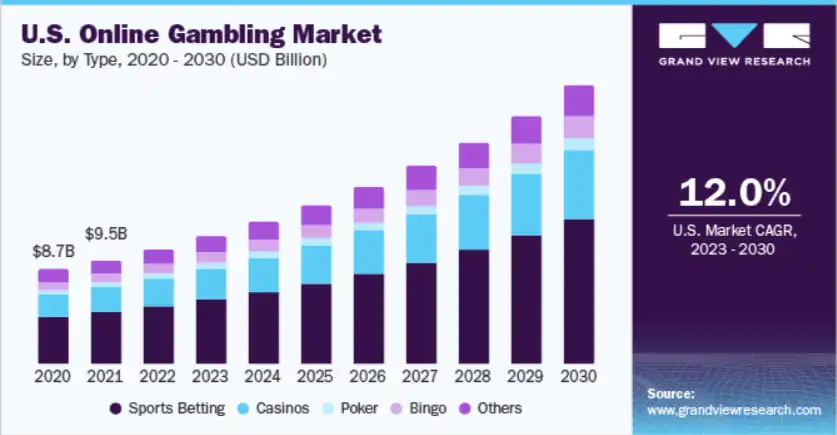Imagine a world where the thrill of Las Vegas, the strategy of Monte Carlo, and the glitz of Macau are all at your fingertips. This is not a premise for a science fiction novel but the vibrant reality of iGaming. Over the years, iGaming has morphed from a niche pastime to a colossal industry that connects millions of players from all corners of the globe. But what exactly is iGaming? What are its different forms, and how did this phenomenon come into being?
Journey with us as we delve deep into the mesmerizing world of iGaming – exploring its evolution, types, and magnetic appeal that has players hooked.
🎲 What is iGaming?
iGaming is a term used to describe any form of online betting and gambling activity, where players bet on the future outcome of a game, sport, or event. It encompasses a wide range of activities, including:
- 🏏 Sports betting
- 🎰 Online casinos
- 🃏 Poker
- 🎮 eSports
The primary difference between gaming and iGaming is that iGaming involves gambling, while online gaming includes recreational single- and multiplayer games that do not use real money for gambling. The iGaming industry has been growing rapidly in recent years, driven by advancements in technology, improved visual and audio design, and the increasing popularity of online betting services.
The legality of iGaming varies depending on the jurisdiction, with different countries and states having their own regulations and laws governing online gambling activities. As the industry continues to evolve, it is expected to witness several changes, including the potential adoption of cryptocurrencies as a valid form of payment for betting.
How does iGaming differ from Traditional Gambling?
iGaming differs from traditional gambling in several ways, including the platform, accessibility, and variety of games offered. Here are some key differences between iGaming and traditional gambling:
- Platform: iGaming takes place online, using electronic devices such as computers, smartphones, and tablets, while traditional gambling occurs in physical locations like casinos, betting shops, and racetracks.
- Accessibility: iGaming allows players to access gambling services from anywhere with an internet connection, providing greater convenience and flexibility compared to traditional gambling, which requires visiting a physical location.
- Variety of games: iGaming offers a wider range of games and betting options, including sports betting, online casinos, poker, and eSports. Traditional gambling venues may have a more limited selection of games and betting opportunities.
- Anonymity: iGaming provides a level of anonymity for players, as they can gamble from the privacy of their own homes or on their mobile devices. In contrast, traditional gambling venues require players to be physically present, making it a more public activity.
- Payment options: iGaming platforms often support various payment methods, including credit cards, e-wallets, and cryptocurrencies. Traditional gambling venues may have more limited payment options, such as cash or credit cards.
- Promotions and bonuses: iGaming platforms frequently offer promotions, bonuses, and loyalty programs to attract and retain players. Traditional gambling venues may also offer promotions, but they may not be as extensive or frequent as those found in iGaming.
Ultimately, the choice between iGaming and traditional gambling depends on individual preferences and priorities, such as convenience, game variety, and the desire for anonymity.
⌛ History of iGaming 🎰

The iGaming industry has come a long way since its inception in the 1990s. Here is a brief overview of the history of iGaming, highlighting its origins, key milestones, and the evolution of the industry.
The first iGaming website was launched by Microgaming in 1994, marking the beginning of the online gambling industry. In 1996, the Kahnawake Gaming Commission was established to regulate the gaming industry.
- Early developments: In the late 1990s, several pioneering online casinos emerged, such as InterCasino and The Gaming Club. These early casinos were basic in design and functionality but paved the way for the development of the online casino industry.
- Technological advancements: Over the past two decades, the iGaming industry has witnessed significant technological advancements, such as the introduction of live dealer games, virtual reality casinos, and mobile gambling apps. These innovations have improved the overall gaming experience and attracted a larger audience.
- Growth and expansion: The iGaming industry has experienced rapid growth, with the global market reaching $64.13 billion in 2020 and projected to grow to $125.65 billion by 2025. This growth has been fueled by technological advancements, shifting consumer behavior, and dynamic market forces.
- Regulation and responsible gambling: As the iGaming industry has grown, so too has the focus on regulation and responsible gambling practices. In recent years, companies have invested in responsible gaming initiatives, such as implementing new responsible gaming policies, offering self-exclusion options, and educating players about the risks of gaming.
The iGaming industry continues to evolve, driven by technological innovations, changing consumer preferences, and an increasingly competitive market scenario. As the industry moves forward, it is expected to witness further growth and development, offering new opportunities for both players and operators alike.
iGaming Platforms
iGaming platforms encompass a wide range of online gambling activities, including online casinos, sports betting websites and poker rooms. Each type of platform offers unique gaming experiences and caters to different preferences among players.
Online Casinos
Online casinos provide a virtual environment where players can engage in various casino games such as slots, table games, and live dealer games. These platforms often offer a wide selection of games, including popular options like blackjack, roulette, and baccarat. Many online casinos also feature electronic poker games, such as Three Card Poker, Caribbean Stud Poker, and Side Bet City. Players can enjoy these games for real money or practice in free-play mode before committing to real money wagers.
Sports Betting Websites
Sports betting websites allow users to place bets on various sports events, such as football, basketball, and horse racing. These platforms typically offer a wide range of betting options, including moneyline bets, point spreads, and over/under bets. Sports betting websites often feature live betting, where players can place bets on events as they unfold in real-time. Additionally, some platforms may provide expert advice, statistics, and other resources to help players make informed betting decisions.
Poker Rooms
Online poker rooms are dedicated platforms for playing poker games, such as Texas Hold'em, Omaha, and Seven Card Stud. These platforms host cash games, tournaments, and sit-and-go events, catering to players with varying skill levels and bankrolls. Players can choose between virtual poker games, where they compete against computer-generated opponents, or live poker games, where they play against other players in real time with professional dealers. High-stakes cash games and tournaments with guaranteed prize pools are also available for more experienced players.
iGaming platforms offer a diverse range of gambling experiences, from online casinos and sports betting websites to poker rooms. Players can choose the platform that best suits their preferences and enjoy a variety of games, betting options, and competitive environments.
Responsible Gambling in iGaming
The allure of iGaming is undeniable. With the rapid expansion of this digital frontier, the promise of jackpots, vibrant graphics, and 24/7 accessibility makes online games irresistibly engaging. Yet, like all things, balance is essential. While most people gamble for fun and entertainment, it's crucial to recognize and address the potential risks. This is where responsible gambling practices come into play.
The Importance of Responsible Gambling Practices
- Safeguarding Mental Well-being: Continuous and uncontrolled gambling can lead to stress, anxiety, and other mental health issues. Responsible gambling practices ensure that players remain in control of their habits, emphasizing fun over financial gain.
- Financial Security: Playing responsibly means setting a budget and sticking to it. This ensures players don't chase losses or spend more than they can afford, safeguarding their financial well-being.
- Ensuring Fair Play: A commitment to responsible gambling also means a commitment to transparency and fairness in games. iGaming operators who emphasize responsibility are more likely to offer fair games, ensuring an honest and enjoyable experience for players.
The Power of Self-Exclusion
One of the most powerful tools in promoting responsible gambling is self-exclusion. Players have the option to exclude themselves from online platforms for a specified period, offering a break from the digital gaming world. This mechanism:
- Helps players regain control if they feel their gaming habits are becoming problematic.
- Provides a cooling-off period, allowing players to reassess their priorities.
- Demonstrates the industry's commitment to player welfare over profits.
Player Support: More than Just a Helpline
The iGaming industry has a pivotal role in supporting players and ensuring their experience is both fun and safe. Many operators now provide:
- 24/7 Helplines: Offering immediate assistance and guidance to those who feel they might be developing a gambling problem.
- Educational Resources: Guides, videos, and quizzes to educate players about safe gambling habits.
- Limit Setting Tools: Allowing players to set deposit, loss, and wagering limits on their accounts.
The rise of iGaming has brought entertainment to the doorsteps of millions. But with this growth comes the responsibility to ensure that the industry remains a source of joy and not distress. Through responsible gambling practices, self-exclusion options, and robust player support, the iGaming world showcases its commitment to the well-being of its community, ensuring that fun remains the heart of the game.
Now let's say that you have got everything covered, but what are the common payment methods offered in iGaming?
Payment Methods in iGaming
In the dynamic world of iGaming, the experience isn't just about engaging graphics, immersive sounds, or tantalizing jackpots. It's also about how easily and securely you can transact, placing bets and withdrawing winnings. Modern iGaming platforms recognize this, and as a result, players are now spoilt for choice when it comes to payment methods. Let's explore the leading options:
🎴 Credit and Debit Cards
The longstanding titans of online transactions, credit and debit cards like Visa, Mastercard, and American Express, remain popular due to their widespread acceptance and familiarity.
🟢 Pros:
- ✅ Widespread Acceptance: Most iGaming platforms readily accept these cards.
- ✅ Security: Banks and card providers implement robust security measures, including encryption and fraud detection.
😡 Cons:
- ❌ Processing Delays: Withdrawals to cards can sometimes take several days.
- ❌ Declines: Some banks might block gambling-related transactions.
💰 E-Wallets
Digital wallets, often referred to as e-wallets, such as PayPal, Skrill, and Neteller, have surged in popularity in the iGaming industry. These platforms act as a middleman between your bank and the gaming site.
🟢 Pros:
- ✅ Speed: Transactions, especially withdrawals, are often faster than with credit cards.
- ✅ Privacy: Your banking details are never shared with the iGaming platform.
- ✅ Bonus Eligibility: Some platforms offer special bonuses when using certain e-wallets.
😡 Cons:
- ❌ Fees: Some e-wallets may charge fees for transactions.
- ❌ Restrictions: Not all iGaming platforms accept every e-wallet, and some bonuses might be restricted to specific payment methods.
🪙 Cryptocurrencies
The rise of digital currencies like Bitcoin, Ethereum, and Litecoin has found its way into the iGaming space, offering a decentralized transaction method.
🟢 Pros:
- ✅ Anonymity: Cryptocurrency transactions can offer greater privacy than traditional methods.
- ✅ Low Fees: Often, the transaction fees are lower than traditional payment methods.
- ✅ Innovation: Some platforms offer games and bonuses tailored specifically for cryptocurrency users.
😡 Cons:
- ❌ Volatility: Cryptocurrencies can be highly volatile, meaning the value of your holdings can fluctuate significantly.
- ❌ Complexity: For newcomers, using and understanding cryptocurrencies might pose a steeper learning curve.
📈 Future Trends in iGaming Industry

The iGaming universe, once a burgeoning segment of the gaming world, has grown to eclipse traditional gambling methods and stands as a testament to the power of digital innovation. With its digital-first approach and adaptability, the industry has achieved astronomical growth in recent years. Let’s delve into its current state, evaluate its growth potential, and identify the trends poised to shape its future.
Current State of the iGaming Industry
Rapid Expansion: iGaming has seen phenomenal growth, especially in the last decade. By 2021, the global online gambling market was estimated to be worth over $60 billion, with projections suggesting a continued rise.
Diverse Portfolio: From online poker rooms, digital slots, and live casino games to sports betting platforms, the variety of offerings keeps expanding, catering to a broad spectrum of players.
Geographic Proliferation: Regions like Europe and parts of Asia have seen a robust iGaming ecosystem. Meanwhile, countries like the US, with changing legislations, are now becoming promising markets.
Growth Potential
Emerging Markets: With more countries revising gambling regulations and embracing online platforms, untapped markets are poised to fuel the next phase of growth. Latin America, parts of Africa, and the US are notable examples.
Technological Innovations: Advancements in AI, VR, and AR can revolutionize the gaming experience, driving user engagement and, consequently, industry growth.
Integration with Other Entertainment Forms: Collaborations with the entertainment industry, be it movies, TV shows, or celebrities, offer a significant avenue for growth by attracting a more diverse user base.
Future Trends Shaping the Industry
Mobile-First Approach: With the ubiquity of smartphones, the majority of iGaming activities are expected to shift to mobile platforms. Operators will likely focus on optimizing mobile gaming experiences.
Blockchain and Cryptocurrencies: Beyond merely serving as a payment method, blockchain technology offers transparency, fairness, and security in gaming operations, and its role will likely be amplified.
Sustainability and Responsibility: As the industry grows, so does the responsibility to ensure players' well-being. Operators will focus more on promoting responsible gambling, providing tools and resources to help players manage their habits.
Esports Betting: The rise of competitive video gaming, or esports, presents a vast opportunity. Esports betting platforms are expected to emerge as a significant segment within the iGaming universe.
The iGaming industry, fueled by technological advancements, evolving player preferences, and changing regulatory landscapes, promises an exciting future. It remains a realm of endless possibilities, with innovations and trends continuously reshaping the gaming narrative, ensuring players always have something novel to look forward to.
iGaming: A Journey of Innovation and Responsibility
As we stand on the precipice of this digital gaming revolution, it's awe-inspiring to reflect on the leaps iGaming has made – transitioning from a niche entertainment form to a colossal industry that is redefining the very essence of gambling. The vibrant tapestry of iGaming, interwoven with dazzling graphics, strategic gameplay, and digital innovations, promises a future brimming with potential.
But as we enthusiastically embrace the emerging trends – from the mobile-first gaming approach to the thrilling intersection of blockchain and betting – it is crucial to anchor ourselves to the foundational principle of responsibility. The true essence of iGaming lies not just in the glitz and glamour but in the industry's commitment to creating a safe, transparent, and inclusive environment for all players. This dual journey, marked by relentless innovation and unwavering responsibility, is what makes iGaming more than just games – it's a reflection of a progressive, interconnected, and conscientious digital world.
Whether you're a seasoned gamer, a curious observer, or an industry stakeholder, the future of iGaming ignites with promise and excitement. And as we move forward, let's remember to play wisely, embrace change, and most importantly, enjoy the vibrant mosaic of experiences that this dynamic industry offers.

![How to Play Mini Baccarat? From Novice to Pro [2025 Guide]](https://gamingparkey.com/wp-content/uploads/2023/09/Discover-How-to-Play-Mini-Baccarat--450x338.webp)












